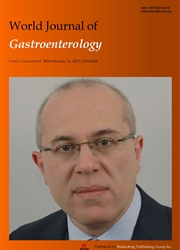

 中文摘要:
中文摘要:
Heme oxygenase-1 (HO-1 ) 系统催化 heme 到生物学上活跃的产品:碳一氧化物, biliverdin/bilirubin 和免费的铁。它涉及维持细胞的动态平衡和生理的许多和 pathophysiological 过程。证据的成长身体显示 HO-1 激活可以在胃肠的道的尖锐、长期的发炎起一个重要保护的作用。这评论在迄今为止学习的胃肠的发炎集中于感应的 HO-1 和它的可能的角色的生理的意义的当前的理解。由药理学工具或用基因治疗的 upregulate HO-1 的能力以后可以为胃肠的发炎提供治疗学的策略。
 英文摘要:
英文摘要:
Heme oxygenase-1 (HO-1) system catalyzes heme to biologically active products: carbon monoxide, biliverdin/bilirubin and free iron. It is involved in maintaining cellular homeostasis and many physiological and pathophysiological processes. A growing body of evidence indicates that HO-1 activation may play an important protective role in acute and chronic inflammation of gastrointestinal tract. This review focuses on the current understanding of the physiological significance of HO-1 induction and its possible roles in the gastrointestinal inflammation studied to date. The ability to upregulate HO-1 by pharmacological means or using gene therapy may offer therapeutic strategies for gastrointestinal inflammation in the future.
 同期刊论文项目
同期刊论文项目
 同项目期刊论文
同项目期刊论文
 An Intronic Polymorphism in GRP78 Improves Chemotherapeutic Prediction in Non-small Cell Lung Cancer
An Intronic Polymorphism in GRP78 Improves Chemotherapeutic Prediction in Non-small Cell Lung Cancer No association between the haplotypic block in the 3' UTR of GRP78 and risk of hepatocellular carcin
No association between the haplotypic block in the 3' UTR of GRP78 and risk of hepatocellular carcin 期刊信息
期刊信息
